Share

Invisible Not Broken - Chronic Illness Podcast Network
Lyme, Fibromyalgia, Migraines, Medication, and Nonbinary Trans Talk on Invisible Not Broke
Sign up with your email address to receive news and updates.
Email Address Sign UpWe respect your privacy.
Thank you! Warning: We really got into some intense issues from body issues, to disordered eating to suicide. If these are upsetting please look under recommendations for help and helplines.First an apology on behalf of Skype on the frustrating audio! If any of you tech geniuses know another way to conduct interviews with everyone being able to see each other PLEASE reach out! Otherwise, I PROMISE you this interview is worth listening to even with the audio. Eliott has become one of my favorite people. I can not thank Eliott enough for VERY gently correcting my language to be more inclusive and for explaining trans and nonbinary in ways that I could really understand. Eliott also has some incredible coping issues for pain management which they learned from fibromyalgia, benign hyper-mobility, after effects of Lyme disease, depression, generalized anxiety. I hope you enjoy and please listen both weeks. This is our first 2 parter. RecommendationsAnyway, Here are some resources for the podcast notes!-Trans lifeline (a trans-run hotline for trans people that also works with microgrants to help trans people change their IDs) : (+18775658860 US/ +18773306366 CANADA/ https://www.translifeline.org/)
-A basic definition & concept breakdown: http://www.tranarchism.com/2010/11/26/not-your-moms-trans-101/
-An article about understanding genderqueer, a term like nonbinary https://genderqueer.me/2013/04/17/explaining-genderqueer-to-those-who-are-not/
-alokvaid menon on instagram (alokvmenon—live videos especially) and their page on facebook, They’re a trans, gender non-conforming person of colour who is excellent at being honest and vulnerable in their daily experiences of cissexism and harassment
-comingoutasnonbinary.tumblr.com
-blog about chronic illness: chronicill on wordpress or chronc-ill.tumblr.com
-collage instagram: eliottgennieve (touches on chronic physical and mental illness, being trans and nonbinary, and other various life things)
-nonbinary 101/meeting a nonbinary person: https://valprehension.com/genderqueer-101/
-an answer to common questions:
https://everydayfeminism.com/2015/08/trans-questions-201/
-a video to explain the term nonbinary to kids:
https://m.huffpost.com/us/entry/us_5a7b47f7e4b044b38218a380
-a basic trans healthcare breakdown: https://www.healthline.com/health/transgender-friendly-healthcare-language#4
-also a fellow podcast! How To Be a Girl
-a website with a lot of articles directed at parents of kids coming out as LGBTQ: http://mykidisgay.com/category/gender/
-Chronically Fully Sick in Facebook
-post on They pronouns in grammar: https://motivatedgrammar.wordpress.com/2009/09/10/singular-they-and-the-many-reasons-why-its-correct/
-article about talking to a trans person etiquette:
https://www.autostraddle.com/how-to-talk-to-a-transperson-76785/
-PDFs of a book about gender:
https://www.emofree.com/nl/eft-tutorial/tapping-basics/how-to-do-eft.htmlWhat is the best purchase under $100 that helped your life
CBD Innescents Salvation Hot Freeze Skin Salve (they have various sizes, all under 100–I have a $14 one)
-Ice Face Mask/Cold Therapy mask, the brand I got was Perfecore from Amazon ($20)
-Electric Heating pad (I got this a long time ago but I believe it was $20-30)
What is your disorder? *
fibromyalgia, benign hypermobility, after effects of Lyme disease, depression, generalized anxiety
At what age did your disorder become a daily issue? *
8
Who were you before your illness became debilitating? *
Same person I am now? Maybe more confident in my ability to do multiple things in a day.
What would you do if you were not dealing with your invisible illness? *
Probably adventuring outside much more and seeing my friends more often. Running, swimming, or otherwise working out more. Riding my longboard.
What would you like people to know about your daily life? *
My capacity to do things can vary by the hour and even when I’m “fine” there’s at least a minimal base level of pain.
What would make living and moving in the world easier for you? *
Less fear of judgment from strangers about my age & appearance & use of a cane. Understanding from employers about the variability of my disabilities. Access to medical marijuana.
Do you have any life hacks? *
Have friends who encourage you but also understand your limits may fluctuate. Keep your car keys in the same place, like a basket by the front door esp if you have fibro fog. Keep water & a heating pad by the bed, along with art supplies and electronics & chargers.
What kind of support do you get from family or friends? *
I currently live with my parents and they help with buying groceries and sometimes cooking food I can eat (I’m vegan, they’re not). My friends support me with advice and their belief in me.
Have you ever had someone not believe you have an invisible illness because of your appearance and if so are there any examples that stand out? *
Yes
How has your invisible illness affected your relationships? *
I don’t get out much to meet people, so I don’t meet new people and miss hanging with the ones I know. Romantically, using a cane & having an unpredictable body seems too scary for other people.
Is there anything you are afraid to tell people in your life? *
How much pain I’m actually in and how long it actually lasts
Does the fact that your disease is invisible change how healthcare professionals treat you? *
Yes, doctors don’t see my condition as urgent or believe how frustrating it can be. I feel like I’m also treated immaturely because of my age in combo.
What is your best coping mechanism? *
writing poetry or blog posts, cooking, and making art (also weed— but I can’t access that/mention it due to my job)
What are you the most concerned about and the hopeful for in the future? *
I’m most concerned that I won’t be able to complete my degree and I’ll have to move back home, and that I won’t be able to go on the road trips, travel, or hike how I want to. I’m most hopeful for all the really awesome experiences I’ll gain in graduate school and just in life because I love to do things like go skydiving and I want to do so much more.
What is your favorite swear word?
Fuck
What is the hardest and/or best lesson your condition has taught you?
Not to take days where I can do whatever I want in terms of physical activity for granted. That true friend will work to understand and be accommodating of your needs.
More episodes
View all episodes
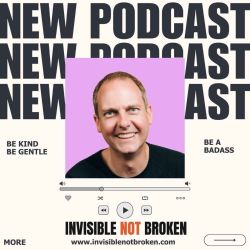
Vulnerability, Resiliency, and Advocacy with Tim Reitsma
47:06Monica Michelle is joined by consultant and podcast host Tim Reitma.Tim lives with Crohn's Disease.In this episode, Monica and Tim discuss: Tim’s resiliency through managing his Crohn’sThe importance of self-advocacy, especially in the workplace Tim’s podcast why he shares stories of those with invisible illness TIMESTAMPS00:47 - Tim's diagnosis 06:31 - How and why Tim applies self advocacy15:41 - Why Tim started his podcast22:42 - Invisible condition etiquette31:00 - What HR can do better for employees with invisible illness39:31 - Tools Tim uses to care for his Crohn’s outside the homeThe full transcript and all links mentioned can be found on the episode page on invisiblenotbroken.com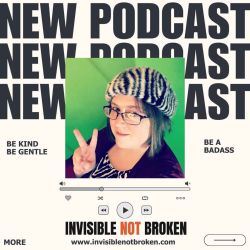
Tech and Disability: What VR Offers the Disabled Community with Sunny Ammerman
01:10:27Monica Michelle is joined by artist and disability advocate Sunny AmmermanSunny lives with Septo-optic dysplasia, panhypopituitarism, Optic Nerve Hypoplasia, and is missing a membrane in the brain called the "septum pellucidum".In this episode, Monica and Sunny discuss: Sunny’s complex disorders and how she copes with themEverything VR provides from accessible gaming, social platforms and the potential for better online education.Various VR/AR games and their gameplay Sunny’s VR support groupTIMESTAMPS00:45 - What VR/AR offers for chronically ill and disabled folks11:57 - Sunny’s conditions and how she copes with them17:55 - Features that make VR games accessible or inaccessible as well as different games and their play experiences37:13 - The social aspects of virtual gaming51:32 - What opportunities VR has for the future1:04:49 - Sunny’s VR support group The full transcript and all links mentioned can be found on the episode page on invisiblenotbroken.com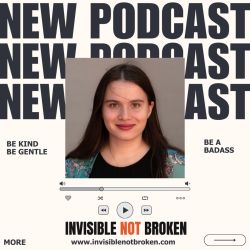
Reporting on Chronic Illness and Disability with Journalist Julia Metraux
39:16Monica Michelle is joined by Journalist Julia Metraux.Julia lives with vasculitis, mild to moderate hearing loss, and has experienced long COVID.In this episode, Monica and Julia discuss: Julia's diagnosis with vasculitis and how it influences her journalistic lensHow community impacts the mental health of those with chronic illnessHow Julia and Monica find positives and negatives in the internet spaces for chronically ill and disabled folksThe politics of how government, businesses, and celebrities influence the chronic illness community TIMESTAMPS00:32 - Julia's diagnostic journey07:02 - Julia’s work reporting on the online community of chronic illness 16:32 - The effect of Internet communities on chronically ill and disabled folks26:46 - How Julia’s illness impacts her work, both in what she writes about and how she manages her lifestyleThe full transcript and all links mentioned can be found on the episode page on invisiblenotbroken.com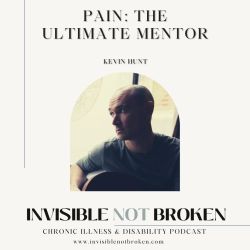
Author of “Pain: The Ultimate Mentor,” Physiotherapist Kevin Hunt
31:29Monica Michelle is joined by author & physiotherapist Kevin Hunt.Kevin lives with chronic pain.In this episode, Monica and Kevin discuss: Kevin’s philosophy of pain management as a physiotherapist who experiences chronic pain. The Hexagon Model, a life-management tool for focusing on what’s important to you.Kevin’s idea behind his new book.Using pain as a guide.TIMESTAMPS00:34 - Kevin’s work as a physiotherapist specializing in the experience of pain 06:44 - The Hexagon Model for managing your life’s needs14:00 - Putting aside the idea of a “quick fix”19:45 - Kevin’s personal experience with pain and how he uses it with patients28:44 - Kevin’s book, “Pain: The Ultimate Mentor”The full transcript and all links mentioned can be found on the episode page on invisiblenotbroken.com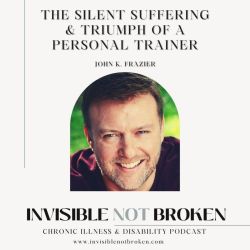
Author of “Through the Pain: The Silent Suffering & Triumph of a Personal Trainer”: John K. Frazier
28:35Monica Michelle is joined by author & personal trainer John K. Frazier.John lives with ankylosing spondylitis.In this episode, Monica and John discuss: John’s work as a physical trainer and authorChronic pain comparisonsPersonal triumphTIMESTAMPS00:50 - John’s business & diagnosis07:19 - Chronic pain olympics09:31 - Talking about & hiding a diagnosis15:09 - Personal triumph18:24 - Staying in the present23:29 - The superman complexThe full transcript and all links mentioned can be found on the episode page on invisiblenotbroken.com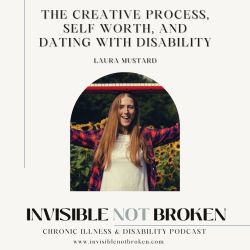
The Creative Process, Self Worth, and Dating with Disability: Laura Mustard
31:08Monica Michelle is joined by musician Laura Mustard.Laura lives with VATER syndrome.In this episode, Monica and Laura discuss: Laura’s inspiration for her upcoming musical EP.How Laura’s illness impacted her recent relationship & self-image.Laura’s creative process, new music, and social media pressure.TIMESTAMPS00:30 - Laura’s new EP / Monica’s recent COVID experience05:32 - Relationships with chronic illness11:20 - Image and self acceptance with disability15:32 - Laura’s creative process and current projects20:05 - Pursuing creativity despite social media attentionThe full transcript and all links mentioned can be found on the episode page on invisiblenotbroken.com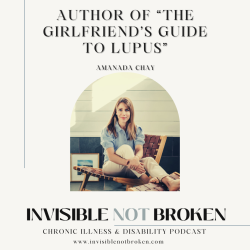
Author of “The Girlfriend’s Guide to Lupus”: Amanda Chay
30:43Monica Michelle is joined by author Amanda Chay.Amanda lives with Sjögren’s and Lupus.In this episode, Monica and Amanda discuss: Amanda’s book & diagnosisOutlooking on work & writingNavigating chronic illness with kids & familyTIMESTAMPS00:26 - Intro + The Girlfriend’s Guide to Lupus02:17 - Amanda’s diagnosis10:09 - Amanda’s outlook on writing17:11 - Navigating chronic illness with kids & family23:29 - Labels and roles26:24 - Flare reads & closing remarksThe full transcript and all links mentioned can be found on the episode page on invisiblenotbroken.com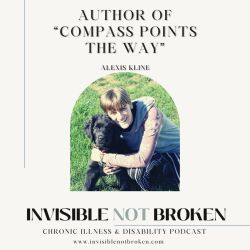
Author of “Compass Points the Way”: Alexis Kline
23:14Monica Michelle is joined by author Alexis Kline.Alexis lives with Dysautonomia.In this episode, Monica and Alexis discuss: Being a sick teenagerHaving an isolated diagnosisProductivity workflowsTIMESTAMPS00:28 - Alexis’s diagnosis & dog07:18 - Sick teenager road map10:00 - Alexis’s book & workflow16:25 - Having an isolated diagnosis20:50 - Wildlife photography, purchases The full transcript and all links mentioned can be found on the episode page on invisiblenotbroken.com
Author of “From the Sidelines to the Finish Line”: Emily Falcon
36:47Monica Michelle is joined by author Emily Falcon.Emily lives with ALCAPA.In this episode, Monica and Emily discuss: Growing up sickPost-surgery supportHaving a public bodySelf-motivation and adventuringTIMESTAMPS00:28 - Being a sick kid & Emily’s book title07:28 - Mortality10:16 - Portrayal of disability in media12:21 - Post-surgery support19:23 - Having a public body23:43 - Self-motivation29:46 - Emily’s tips for adventuresThe full transcript and all links mentioned can be found on the episode page on invisiblenotbroken.com